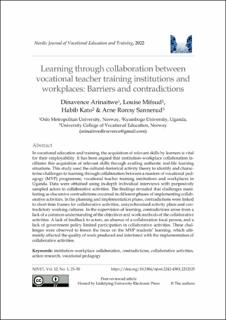| dc.contributor.author | Arinaitwe, Dinavence | |
| dc.contributor.author | Mifsud, Louise | |
| dc.contributor.author | Habib, Kato | |
| dc.contributor.author | Sannerud, Arne Ronny | |
| dc.date.accessioned | 2023-01-04T12:29:17Z | |
| dc.date.available | 2023-01-04T12:29:17Z | |
| dc.date.created | 2022-02-17T16:05:09Z | |
| dc.date.issued | 2022-02-09 | |
| dc.identifier.citation | Nordic Journal of Vocational Education and Training. 2022, 12 (1), 25-50. | en_US |
| dc.identifier.issn | 2242-458X | |
| dc.identifier.uri | https://hdl.handle.net/11250/3040935 | |
| dc.description.abstract | In vocational education and training, the acquisition of relevant skills by learners is vital for their employability. It has been argued that institution–workplace collaboration facilitates this acquisition of relevant skills through availing authentic real-life learning situations. This study used the cultural–historical activity theory to identify and characterise challenges to learning through collaboration between a masters of vocational pedagogy (MVP) programme, vocational teacher training institutions and workplaces in Uganda. Data were obtained using in-depth individual interviews with purposively sampled actors in collaborative activities. The findings revealed that challenges manifesting as discursive contradictions occurred in different phases of implementing collaborative activities. In the planning and implementation phase, contradictions were linked to short time frames for collaborative activities, unsynchronised activity plans and contradictory working cultures. In the supervision of learning, contradictions arose from a lack of a common understanding of the objectives and work methods of the collaborative activities. A lack of feedback to actors, an absence of a collaboration focal person, and a lack of government policy limited participation in collaborative activities. These challenges were observed to lessen the focus on the MVP students’ learning, which ultimately affected the quality of work produced and interfered with the implementation of collaborative activities. | en_US |
| dc.language.iso | eng | en_US |
| dc.publisher | Linköpings University Electronic Press | en_US |
| dc.relation.ispartofseries | Nordic Journal of Vocational Education and Training;Vol. 12, No. 1 | |
| dc.rights | Navngivelse 4.0 Internasjonal | * |
| dc.rights.uri | http://creativecommons.org/licenses/by/4.0/deed.no | * |
| dc.subject | Institution–workplace collaboration | en_US |
| dc.subject | Contradictions | en_US |
| dc.subject | Collaborative activities | en_US |
| dc.subject | Action research | en_US |
| dc.subject | Vocational pedagogy | en_US |
| dc.title | Learning through collaboration between vocational teacher training institutions and workplaces: Barriers and contradictions | en_US |
| dc.type | Peer reviewed | en_US |
| dc.type | Journal article | en_US |
| dc.description.version | publishedVersion | en_US |
| dc.rights.holder | © The authors | en_US |
| cristin.ispublished | true | |
| cristin.fulltext | original | |
| cristin.qualitycode | 1 | |
| dc.identifier.doi | https://doi.org/10.3384/njvet.2242-458X.2212125 | |
| dc.identifier.cristin | 2003006 | |
| dc.source.journal | Nordic Journal of Vocational Education and Training | en_US |
| dc.source.volume | 12 | en_US |
| dc.source.issue | 1 | en_US |
| dc.source.pagenumber | 25-50 | en_US |

